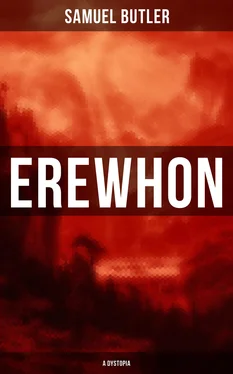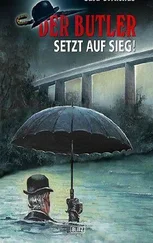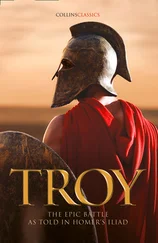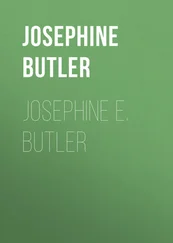In about a quarter of an hour we got to a small Hamlet built on the side of a hill, with a narrow street and houses huddled up together. The roofs were large and overhanging. Some few windows were glazed, but not many. Altogether the village was exceedingly like one of those that one comes upon in descending the less known passes over the Alps on to Lombardy. I will pass over the excitement which my arrival caused. Suffice it, that though there was abundance of curiosity, there was no rudeness. I was taken to the principal house, which seemed to belong to the people who had captured me. There I was hospitably entertained, and a supper of milk and goat’s flesh with a kind of oatcake was set before me, of which I ate heartily. But all the time I was eating I could not help turning my eyes upon the two beautiful girls whom I had first seen, and who seemed to consider me as their lawful prize—which indeed I was, for I would have gone through fire and water for either of them.
Then came the inevitable surprise at seeing me smoke, which I will spare the reader; but I noticed that when they saw me strike a match, there was a hubbub of excitement which, it struck me, was not altogether unmixed with disapproval: why, I could not guess. Then the women retired, and I was left alone with the men, who tried to talk to me in every conceivable way; but we could come to no understanding, except that I was quite alone, and had come from a long way over the mountains. In the course of time they grew tired, and I very sleepy. I made signs as though I would sleep on the floor in my blankets, but they gave me one of their bunks with plenty of dried fern and grass, on to which I had no sooner laid myself than I fell fast asleep; nor did I awake till well into the following day, when I found myself in the hut with two men keeping guard over me and an old woman cooking. When I woke the men seemed pleased, and spoke to me as though bidding me good morning in a pleasant tone.
I went out of doors to wash in a creek which ran a few yards from the house. My hosts were as engrossed with me as ever; they never took their eyes off me, following every action that I did, no matter how trifling, and each looking towards the other for his opinion at every touch and turn. They took great interest in my ablutions, for they seemed to have doubted whether I was in all respects human like themselves. They even laid hold of my arms and overhauled them, and expressed approval when they saw that they were strong and muscular. They now examined my legs, and especially my feet. When they desisted they nodded approvingly to each other; and when I had combed and brushed my hair, and generally made myself as neat and well arranged as circumstances would allow, I could see that their respect for me increased greatly, and that they were by no means sure that they had treated me with sufficient deference—a matter on which I am not competent to decide. All I know is that they were very good to me, for which I thanked them heartily, as it might well have been otherwise.
For my own part, I liked them and admired them, for their quiet self-possession and dignified ease impressed me pleasurably at once. Neither did their manner make me feel as though I were personally distasteful to them—only that I was a thing utterly new and unlooked for, which they could not comprehend. Their type was more that of the most robust Italians than any other; their manners also were eminently Italian, in their entire unconsciousness of self. Having travelled a good deal in Italy, I was struck with little gestures of the hand and shoulders, which constantly reminded me of that country. My feeling was that my wisest plan would be to go on as I had begun, and be simply myself for better or worse, such as I was, and take my chance accordingly.
I thought of these things while they were waiting for me to have done washing, and on my way back. Then they gave me breakfast—hot bread and milk, and fried flesh of something between mutton and venison. Their ways of cooking and eating were European, though they had only a skewer for a fork, and a sort of butcher’s knife to cut with. The more I looked at everything in the house, the more I was struck with its quasi-European character; and had the walls only been pasted over with extracts from the Illustrated London News and Punch , I could have almost fancied myself in a shepherd’s hut upon my master’s sheep-run. And yet everything was slightly different. It was much the same with the birds and flowers on the other side, as compared with the English ones. On my arrival I had been pleased at noticing that nearly all the plants and birds were very like common English ones: thus, there was a robin, and a lark, and a wren, and daisies, and dandelions; not quite the same as the English, but still very like them—quite like enough to be called by the same name; so now, here, the ways of these two men, and the things they had in the house, were all very nearly the same as in Europe. It was not at all like going to China or Japan, where everything that one sees is strange. I was, indeed, at once struck with the primitive character of their appliances, for they seemed to be some five or six hundred years behind Europe in their inventions; but this is the case in many an Italian village.
All the time that I was eating my breakfast I kept speculating as to what family of mankind they could belong to; and shortly there came an idea into my head, which brought the blood into my cheeks with excitement as I thought of it. Was it possible that they might be the lost ten tribes of Israel, of whom I had heard both my grandfather and my father make mention as existing in an unknown country, and awaiting a final return to Palestine? Was it possible that I might have been designed by Providence as the instrument of their conversion? Oh, what a thought was this! I laid down my skewer and gave them a hasty survey. There was nothing of a Jewish type about them: their noses were distinctly Grecian, and their lips, though full, were not Jewish.
How could I settle this question? I knew neither Greek nor Hebrew, and even if I should get to understand the language here spoken, I should be unable to detect the roots of either of these tongues. I had not been long enough among them to ascertain their habits, but they did not give me the impression of being a religious people. This too was natural: the ten tribes had been always lamentably irreligious. But could I not make them change? To restore the lost ten tribes of Israel to a knowledge of the only truth: here would be indeed an immortal crown of glory! My heart beat fast and furious as I entertained the thought. What a position would it not ensure me in the next world; or perhaps even in this! What folly it would be to throw such a chance away! I should rank next to the Apostles, if not as high as they—certainly above the minor prophets, and possibly above any Old Testament writer except Moses and Isaiah. For such a future as this I would sacrifice all that I have without a moment’s hesitation, could I be reasonably assured of it. I had always cordially approved of missionary efforts, and had at times contributed my mite towards their support and extension; but I had never hitherto felt drawn towards becoming a missionary myself; and indeed had always admired, and envied, and respected them, more than I had exactly liked them. But if these people were the lost ten tribes of Israel, the case would be widely different: the opening was too excellent to be lost, and I resolved that should I see indications which appeared to confirm my impression that I had indeed come upon the missing tribes, I would certainly convert them.
I may here mention that this discovery is the one to which I alluded in the opening pages of my story. Time strengthened the impression made upon me at first; and, though I remained in doubt for several months, I feel now no longer uncertain.
Читать дальше












